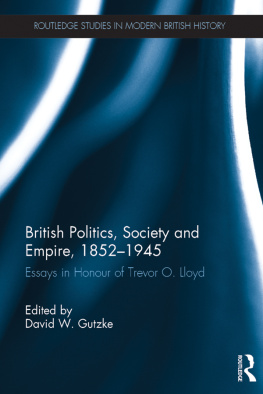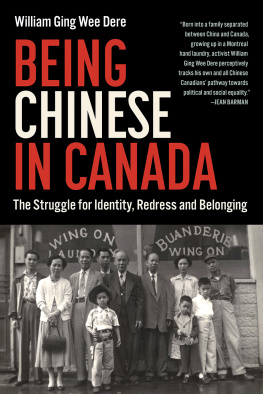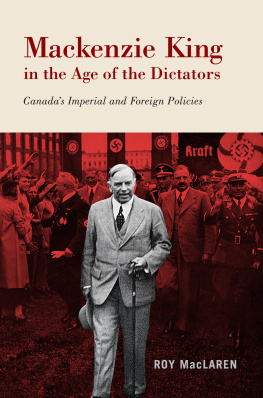CANADA AND THE FIRST WORLD WAR
Second Edition
The First World War is often credited with being the event that gave Canada its own identity, distinct from that of Britain, France, and the United States. Less often noted, however, is that it was also the cause of a great deal of friction within Canadian society. Canada and the First World War examines how Canadians experienced the war and how those experiences were shaped by region, politics, gender, class, and nationalism.
This second edition of Canada and the First World War includes a new introduction reviewing historical perspectives written about the war since the book first appeared in 2005. The essays themselves bring together some of the leading voices in Canadian history to take an in-depth look into the tensions and fractures the war caused, and to address the way some attitudes about the country were changed, while others remained the same. They vary in scope, but are strongly unified so as to create a collection that treats its subject in a complete and comprehensive manner.
This collection, a tribute to one of Canadas greatest authorities on the First War World War, historian Robert Craig Brown, is a significant contribution to the ongoing re-examination of Canadas experiences in war, and a must-read for students of Canadian history.
DAVID MACKENZIE is a professor in the Department of History at Ryerson University.

Robert Craig Brown (Office of the Dean of Arts and Sciences, University of Toronto)
Canada and the First World War
Essays in Honour of Robert Craig Brown
Second Edition
Edited and with a new introduction by David MacKenzie

University of Toronto Press 2005
Toronto Buffalo London
utorontopress.com
Printed in the U.S.A.
Reprinted 2014
Second Edition with a new introduction 2018
ISBN 978-1-4875-2321-3
 Printed on acid-free, 100% post-consumer recycled paper with vegetable-based inks.
Printed on acid-free, 100% post-consumer recycled paper with vegetable-based inks.
Library and Archives Canada Cataloguing in Publication
Canada and the First World War : essays in honour of Robert Craig Brown/edited by David MacKenzie. Second edition.
Includes bibliographical references and index.
ISBN 978-1-4875-2321-3 (softcover.)
1. World War, 19141918 Canada. I. Brown, Robert Craig, 19352016, honouree II. MacKenzie, David (David Clark), 1953, editor
D547.C2C3423 2018 940.3'71 C2018-5279-1
University of Toronto Press acknowledges the financial assistance to its publishing program of the Canada Council for the Arts and the Ontario Arts Council, an agency of the Government of Ontario.

Contents
DAVID MACKENZIE
RAMSAY COOK
TERRY COPP
J.L. GRANATSTEIN
JOHN ENGLISH
PATRICE A. DUTIL
DOUGLAS MCCALLA
JOAN SANGSTER
DESMOND MORTON
ADAM CRERAR
DONALD AVERY
ROD MILLARD
PAUL LITT
DAVID MACKENZIE
MARGARET MACMILLAN
JONATHAN F. VANCE
Illustrations
Preface
This book is a Festschrift for Robert Craig Brown. It sprang from two relatively simple ideas: first, that a book on Canada and the Great War would be a fitting tribute to a historian who has contributed so much to our present understanding of that experience and, second, that such a book could make a contribution to the on-going re-examination of Canadas experiences during the First World War. It has been a quarter of a century since Craig Brown and Ramsay Cooks Canada: A Nation Transformed first appeared, and since that time a new generation of historians and scholars has examined and challenged the way we think about the Great War. New territory has been explored and new questions have been asked about the past, and we believe that the time is right to bring together a collection of essays on Canada and the Great War that reflects the changing times. We all agreed that this is the best way to honour Craig and to acknowledge his contribution to the study of Canadian history.
We are taking a different approach to the Festschrift. Rather than the usual collection of disparate essays, in Canada and the Great War each author was assigned a specific topic on Canada and the war and given enough freedom to explore what he or she believes to be important for the subject. Together, the chapters constitute a broad history of Canadas experience in the First World War while honouring someone who has made a significant contribution to the study of history in Canada. The fifteen authors represent a cross-section of Craigs friends, colleagues, contemporaries, and former students. As individuals they have won virtually every major regional, national, academic, and non-academic book prize, and together they represent the leading scholars on Canada and the Great War, a subject that was, and still is, the focus for much of Craig Browns scholarship. These authors were selected because of their scholarship as historians and as specialists in the field and, by focusing on one subject of broad interest to Canadians, we hope to have produced a book with a longer shelf life than the usual Festschrift.
The different contributors to this book examine how Canadians experienced the Great War and how their experiences were shaped by region, politics, economics, gender, class, ethnicity, and nationalism. In different ways the writers look at the impact of the war on Canadians, at the tensions and fractures in Canadian society, at the upheaval and death, and at the way some attitudes and perceptions about the country changed while others remained the same.
Many people need to be thanked for their help in seeing this book through to publication. First, I must thank all of the contributors for devoting so much time and effort to their chapters over the past few years. In particular, I would like to thank Donald Avery for agreeing to contribute a chapter on western Canada to this project at the last minute. On very short notice, Don graciously agreed to take a chapter from his book Dangerous Foreigners and to update, revise, and shape it into a new chapter that fits so well into this volume.
Len Husband, of the University of Toronto Press, has guided this book through the various stages of publication, and this final product would not have been possible without his effort and his support. For that I am most grateful. Thanks also to Jill McConkey of the University of Toronto Press for her help at the beginning of this project. I would also like to thank Frances Mundy of the University of Toronto Press, Catherine Frost for copy-editing the original manuscript, Dilia Narduzzi for editing the introduction to the second edition, and Anita Levin for her work in preparing the index. This work has been supported in part by a manuscript preparation grant from Ryerson University.
My friends Patrice Dutil and Paul Litt, who evolved as advisers and contributors, provided feedback and humour over the duration of this project. They were always forthcoming with their views, and their support made the work that much easier although our discussions of things historical can hardly be called work. Finally, I would like to thank my wife, Terry, and daughters, Claire and Beth, for their help, patience, and advice as this project evolved slowly from a nice idea into this book.








 Printed on acid-free, 100% post-consumer recycled paper with vegetable-based inks.
Printed on acid-free, 100% post-consumer recycled paper with vegetable-based inks.